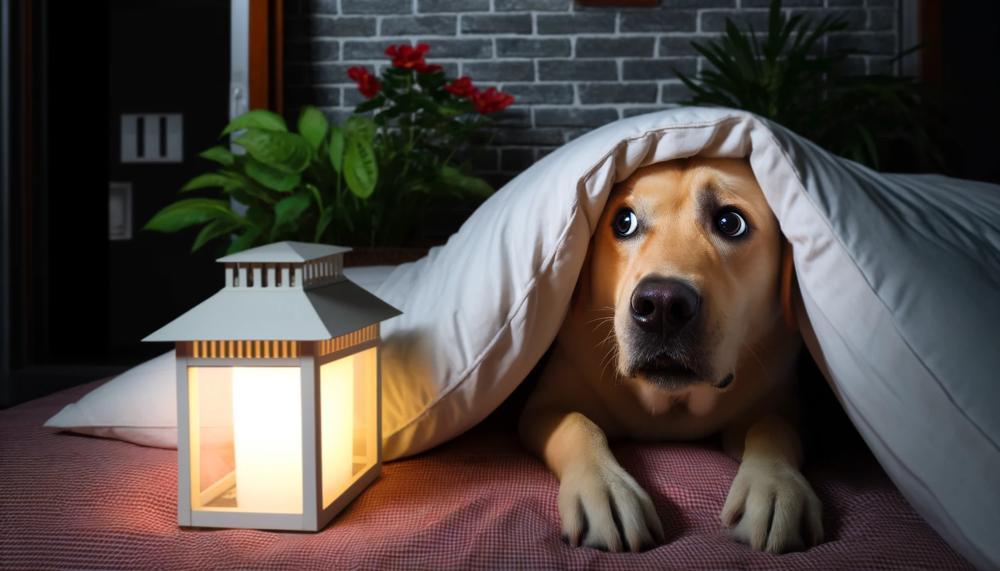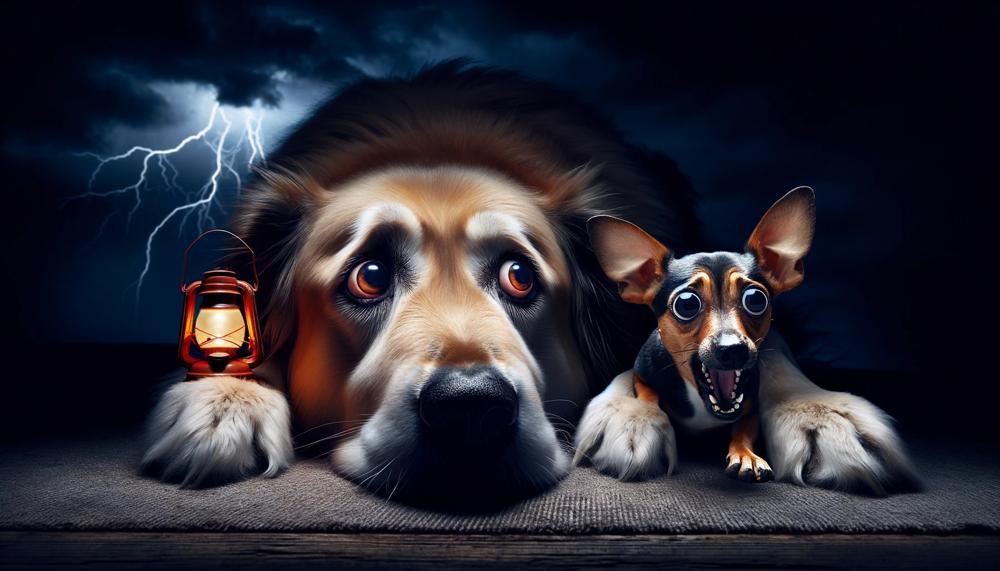Imagine this: It’s a serene evening, the sky is sprinkled with twinkling stars, and you’re ready to take your furry companion for a peaceful stroll under the moonlight.
But as soon as you open the door, your dog freezes, tail tucked between their legs, and refuses to budge. So, why is dog afraid to go outside at night?
There could be several reasons why a dog might be afraid to go outside at night:
- Sensitivity to Sound: Dogs hear at a higher frequency range than humans. So, a sound that might seem comfortable to a person can be deafening and scary to them. If your dog is afraid to go outside at night, there’s a good chance they may have heard something out there that was frightening for them.
- Past Traumatic Experience: This is normal for a puppy or a dog who has been through a traumatic experience, such as a rescue dog. If they used to like the outdoors until now, it’s likely that something recently happened to trigger their fear.
- Fear of the Unknown: Dogs develop strong associations with items, places, sounds, etc. Something could have happened to them that you didn’t realize at the time.
- Vision Is Key: Dogs are afraid to go outside at night due to the lack of vision, odd noises, and the general unknown of what might be lurking around at night.
- Hazardous Terrain: Perhaps your front porch is slippery or there are insects that sting during the night.
So, let’s shed some light on this common yet intriguing phenomenon.
Why is My Dog Afraid to Go Outside at Night
Table of Contents
There are several reasons why your furry companion may fear going outside at night. Here are some common factors that could contribute to their fear:
| Loud or Strange Noises | Dogs have exceptional hearing abilities, making them more susceptible to loud or strange noises at night. The sound of fireworks, thunderstorms, or even construction can startle and scare them, causing them to fear going outside at night. |
| Negative Experiences | If your dog has had a negative encounter while being outside at night, such as encountering an aggressive animal or getting lost, they may develop a sense of fear towards going out again during the dark hours. |
| Lack of Socialization | Dogs who have not been adequately socialized may feel anxious and uncomfortable when exposed to new environments, people, or animals. This can lead to fear towards going outside at night when there may be unfamiliar sights, sounds, and smells. |
| Pain or Health Issues | If your dog is experiencing pain or discomfort, they may be hesitant to go outside at night due to the fear of aggravating their condition. Older dogs with age-related changes like arthritis may also struggle with mobility and may not feel comfortable going out in the dark. |
| Changes in Routine or Surroundings | Dogs thrive on routine and feel most comfortable when they have a set schedule. Any changes in their routine or surroundings, such as moving to a new house or having a new family member, can cause them to feel anxious and afraid of going outside at night. |
It is important to keep in mind that each dog is unique and may have different triggers for their fear towards going outside at night. If your dog’s fear persists or becomes severe, it is essential to observe their behavior and consult with a veterinarian or a professional dog trainer.
They can provide personalized advice and guidance to help your dog overcome their fear and feel safe and comfortable while going outside at night.
Dog Afraid to Go Outside at Night: Potential Reasons
There are several possible reasons why a dog may experience fear when going outside at night. These can range from external factors, such as loud or unusual noises, to internal causes, like past traumas or health problems.
It’s important to consider all potential triggers, as well as the dog’s history and individual needs, when trying to address this issue.
For instance, some dogs may have had negative experiences while out at night, such as encountering other aggressive animals or getting lost in unfamiliar surroundings. As a result, they may associate nighttime with danger and feel anxious when it’s time to go out.
Moreover, a lack of proper socialization during puppyhood can also contribute to a dog’s fear of the dark. Without exposure to different environments and experiences, they may feel overwhelmed and unsure of how to react when faced with new situations.
In some cases, physical pain or discomfort can also play a role in a dog’s aversion to going outside at night. For instance, if a dog is suffering from arthritis or other health issues, the darkness and colder temperatures may exacerbate their symptoms and make them apprehensive about going out.
Furthermore, changes in routine or surroundings can also trigger anxiety in dogs who are already prone to fear or nervousness. A sudden move to a new location or a change in daily activities can disrupt their sense of security and make them more fearful of going outside at night.
And let’s not forget the impact that previous negative associations can have on a dog’s behavior. If a dog has experienced trauma or abuse in the past, they may carry that fear with them and find it difficult to overcome when faced with similar situations.
Lastly, electric fences can also play a role in a dog’s fear of going outside at night. These invisible barriers can be confusing and intimidating for dogs who are not used to them, causing them to hesitate and feel anxious about crossing the boundary.
In addition to these potential reasons, a dog’s fear of going outside at night may also be influenced by previous exposure to storms or other extreme weather conditions. The loud noises, bright flashes of light, and overall unpredictability of these events can be overwhelming for dogs, leaving a lasting impression that can manifest in their behavior.
How to Deal With Your Dog’s Fear of the Dark
| Understand the source of your dog’s fear | Gradually acclimatize your dog to the dark | Use positive reinforcement techniques |
| Create a secure and cozy atmosphere | Consider seeking professional assistance | |
| In conclusion, be patient and celebrate small victories as you help your dog conquer their fear of the dark. | ||
Understand the source of your dog’s fear:
- Pay close attention to your dog’s behavior to identify what triggers their fear.
- Consult with a veterinarian to rule out any underlying health concerns.
- Keep track of when and where your dog displays signs of fear to identify any patterns.
- Consider any recent changes in routine or environment that may have caused their fear.
Gradually acclimatize your dog to the dark:
- Begin by taking your dog outside during dusk when there is still some light.
- Stay in an area where your dog feels safe and secure.
- Slowly increase the amount of time spent outside and the level of darkness as your dog becomes more comfortable.
- Reward them with treats or praise when they display calm or brave behavior.
Use positive reinforcement techniques:
- When your dog shows signs of being at ease outside at night, reward them with treats or praise.
- Associate nighttime outdoors with positive experiences for your dog.
- Avoid scolding or punishing them for expressing fear, as this can worsen their anxiety.
Create a secure and cozy atmosphere:
- Install motion-activated lights around your yard to provide a well-lit path for your dog.
- Play soothing music or use calming scents while your dog is outside.
- Ensure your dog has a safe and comfortable place to retreat to if they become overwhelmed.
Consider seeking professional assistance:

- If your dog’s fear is severe and impacting their daily life, seek help from a professional trainer or behaviorist.
- They can offer personalized techniques and guidance to help your dog overcome their fear in a safe and effective manner.
- Remember to be patient and consistent in implementing their recommendations.
So, helping your dog conquer their fear of the dark may require time and patience, but with these practical steps, you can help them feel more comfortable going outside at night. It is important to understand the root cause of their fear, use positive reinforcement, and create a safe and comfortable environment for them.
Seeking professional help may also be beneficial in severe cases.
How NOT to Deal With the Dog’s Fear of the Dark
Dealing with your dog’s fear of the dark can be quite a challenge, but it’s crucial to approach it with kindness and empathy. Using punishment or negative reinforcement can only make their fear worse and harm your relationship with them.
Here are some effective strategies to help your pup overcome their fear of going outside at night, without resorting to harsh methods.
Understand the Root Cause of Fear
First and foremost, it’s essential to understand why your dog is afraid of the dark. It could be due to poor vision, strange noises, or past traumatic experiences. Observe their behavior and try to identify what triggers their fear.
This will allow you to address the underlying cause and find appropriate solutions.
Use an Illuminating Collar
An LED dog collar is a fantastic tool for nighttime walks. It provides a steady source of light, making it easier for your dog to see and feel safe in the dark. It also increases their visibility to others, reducing potential dangers and making walks safer for everyone.
Introduce Them to Darkness Gradually
Instead of forcing your dog outside at night, try slowly introducing them to the darkness. Take short walks at dawn or dusk when there is still some light outside.
This will help them get accustomed to the darkness in a less intimidating way.
Be Consistent
Consistency is key when helping a dog conquer their fear of the dark. Stick to a familiar route and take them out during the same hours each day.
This will help them feel more secure and bolster their confidence over time.
Create a Comfortable Environment
Make nighttime walks enjoyable for your dog by creating a cozy atmosphere. Bring along treats or toys and play with them during the walk. This will help them associate these walks with positive experiences and reduce their fear.
Remember, every dog is unique, and it may take time for your furry friend to overcome their fear of the dark. Be patient and understanding, and seek professional help if needed.
Conclusion
Last but not least, our beloved dogs can also be afraid of the dark, just like people. Loud noises, bad events, not having many friends, health problems, or changes in habits or environment can all cause this fear. Just like any other responsible dog owner, we need to figure out why our furry friends are scared and help them get over it.
One good method is to slowly let them experience the darkness while using positive feedback. This could mean giving them treats or praise for being brave and going for short walks at night. Making their home feel safe and comfortable can also help ease their fears. It can make a big difference to give them a safe place to go when they are feeling nervous can make a big difference.
You may also need to get professional help if your dog’s fear is very bad and getting in the way of their daily life. You and a professional dog teacher or behaviorist can work together to make a unique plan to help your dog deal with his fears.
It is very important not to punish or negatively reinforce your dog because this can make their nervousness worse and hurt your relationship with them. Instead, help your dog feel safe and at ease in the dark by being consistent, patient, and understanding.
Always put your dog’s health and happiness first, and remember to celebrate small wins along the way.






